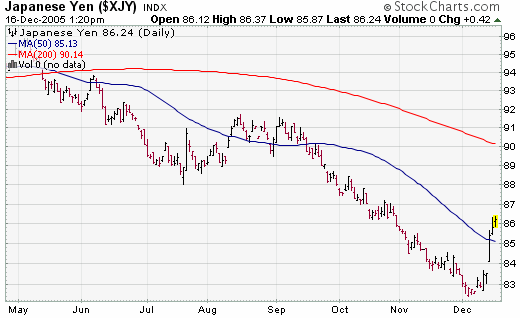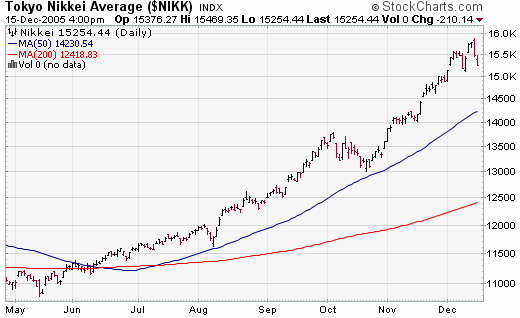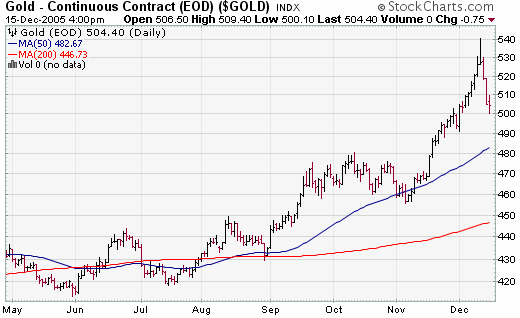Beware of thin market unwinding
Many markets got a bit
speculative in the rally since October, and some of those have spiked
and are now unwinding. Investors need to monitor these markets to watch for
possible spillover effects that could begin influencing other markets negatively
in this holiday thin environment.
The biggest threat on this list is the Yen. The
Yen has been the carry-trade favorite short for a very long time, but
particularly this year. It has traded from 108 to around 123 in very short order
in recent months, after having dropped from nearly 100 this year. The Yen drop
had the blessings of the BOJ and so many assumed it was a no-risk one-way bet.
Speculative positions short the Yen have soared as investors have spread it with
the Dollar, the Euro, Gold, commodities, the Nikkei, and a host of other strong
RS global markets in a high-leverage game.
The situation is somewhat reminiscent of 1998.
The Yen had declined via the same carry-trade mentality from 136 to nearly 150
that year, before fears of Fed rate cuts began to eat away at speculator
mentality. Late in the fourth quarter of that year, the Yen began a very sharp
correction from nearly 150 to 132, which was enough to trigger margin calls and
stop-outs. It then consolidated in a narrow range for a couple weeks before
starting to correct further. Big Macro Traders had to throw in the towel quickly
once the second correction began, and the Yen soared from 134 to 116 in just
four trading days. Such is the nature of thin market environments that have
become one-way streets.

The key point for investors is that the Yen carry
trade was as wide-spread then as it is today, and that the initial sharp move
knocked out some players, but an even sharper move loomed — and this one
impacted many of the markets that the carry trade was paired with. The
similarities are striking enough that investors should monitor the Yen and its
pairs — such as the Nikkei, Gold, commodities and Euro/Yen. A continued
correction in the Yen sharply, could begin to influence these markets strongly.
And contagion could develop and hit global markets — something investors need to
be watchful of.

Already both the Nikkei and Gold and precious
metals (which were in similar vertical run-ups) have felt the Yen unwinding with
rather violent moves. Further correction in the Yen and impact in these markets
should be a warning sign that contagion is growing. Let’s not forget that the
1998 global correction in equities began with currency problems.

For risk-averse chickens like us, this is enough
to warrant scaling back all positions a bit, and significantly doing so in those
instruments paired to the Yen directly.
We continue to cautiously like non-Yen linked
global leaders such as Korea, US transports, insurance, industrials, Latin
Banks, and Brazil — though all of these are getting overdone a bit and
conservative traders should take more partial profits while others should
tighten stops.
Nervousness to protect capital is sometimes a
vice, but often important in keeping drawdowns at a minimum. A not-outstanding
environment is now getting even trickier. Watch the Yen and its pairs carefully
and lighten up into the holiday’s season if things begin to unwind even more.
Mark Boucher
Mark Boucher has been ranked #1 by Nelson’s World’s Best Money Managers for
his 5-year compounded annual rate of return of 26.6%.Boucher began trading at
age 16. His trading helped finance his education at the University of California
at Berkeley, where he graduated with honors in Economics. Upon graduation, he
founded Investment Research Associates to finance research on stock, bond, and
currency trading systems. Boucher joined forces with Fortunet, Inc. in 1986,
where he developed models for hedging and trading bonds, currencies, futures,
and stocks. In 1989, the results of this research were published in the Fortunet
Trading Course. While with Fortunet, Boucher also applied this research to
designing institutional products, such as a hedging model on over $1 billion of
debt exposure for the treasurer of Mead, a Fortune 500 company.
